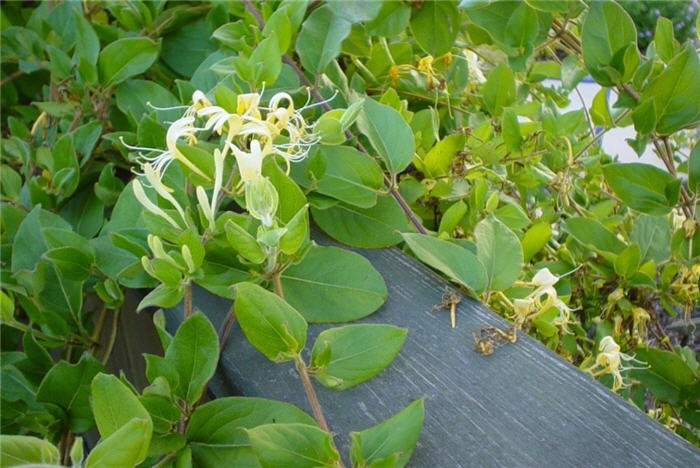| Botanical Name: Lonicera japonica 'Halliana' | |
| Common Name: Halls Honeysuckle |

-
Anatomy
-
Culture
-
Design
Plant Type
Ground cover, Vine
Height Range
12-25', 25-40'
Flower Color
Yellow, White
Flower Season
Spring, Summer
Leaf Color
Green
Bark Color
Brown
Fruit Color
Purple
Fruit Season
Fall
Sun
Full, Half
Water
Medium
Growth Rate
Fast
Soil Type
Sandy, Clay, Loam, Rocky, Unparticular
Soil Condition
Average, Rich, Poor, Well-drained
Soil pH
Neutral
Adverse Factors
Attracts Bees
Design Styles
English Cottage, Mediterranean, Ranch, Seascape, Spanish, Tropical
Accenting Features
Fragrance, Showy Flowers
Seasonal Interest
Spring, Summer
Location Uses
Background, Entry, Walls / Fences
Special Uses
Cascade, Erosion Control, Hedge, Screen, Mass Planting, Fire Resistant, Small Spaces
Attracts Wildlife
Birds
Information by: Stephanie Duer
Photographer: Greg Applegate, Connon N.
Photographer: Greg Applegate, Connon N.
-
Description
-
Notes
Halls Honeysuckle is a vigorous, hardy, twining vine with deep green, oval leaves and fragrant white flowers that change their color to yellow. It is good as a groundcover or for covering fences. Flowers June through October; there are showier honeysuckle, but none as fragrant, except maybe 'Purpurea'. Can grow 15 to 30 feet, or more. Deciduous.
Needs support to become established. Its a twining vine, so it has to have something to wrap its tendrils around. This is an aggressive vine, and so ought to be avoided in riparian corridor areas, or in wild-land interface areas as it could escape and over-take native plants.